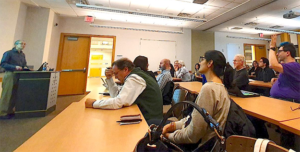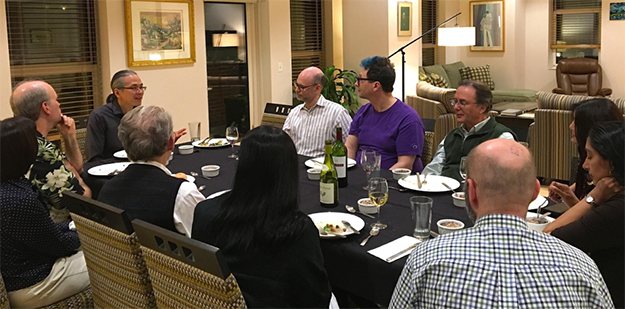Home » News » Esteemed Writer Ted Chiang visits Vanderbilt (Part 2)
Esteemed Writer Ted Chiang visits Vanderbilt (Part 2)
Posted by anderc8 on Wednesday, April 17, 2019 in News, The Ethics of Artificial Intelligence (AI).
Written by Haerin Shin and Douglas H. Fisher
In our previous post we introduced renowned writer and commentator Ted Chiang’s visit to Vanderbilt with a panel on the Societal Implications of Artificial Intelligence and a dinner with 40 students. These events, and those we describe next, were all full houses.
Chiang visited the AI Ethics course to talk about his novella “The Lifecycle of Software Objects,” which the students read as part of the curriculum. He was inspired to envision a virtual community (much akin to the simulated world of Second Life) where humans would nurture and interact with artificially intelligent avatars, because he hoped to present a realistic portrait of artificial general intelligence – one that traced the process of its development, interface and agency in concert with its entanglement with human follies, expectations and investments. The protagonists of the story are software designers who work at a startup that seeks to produce and monetized animal avatars (called digients) that could serve as pets in the virtual space. Spending years nurturing their digients, the two lead characters learn how artificially intelligent nonhuman agents mirror our own traits and quirks while also coming face-to-face with their fundamental alterity, albeit from a different perspective. The students were especially curious to hear about Chiang’s take on how fictional world-building ventures could impact and shape reality. As a meticulous researcher and crafter of imaginary realities, Chiang shared details about his creative process and expounded on his abiding interest in the topic of “free will” (which he described as an amalgam of determinism and agential freedom as a persistent drive to seek and inhabit meaning).
That afternoon, Chiang visited Professor Kunda’s class CS 4269: Project in AI to engage in further conversation with the students and professor Bruce Berry, who teaches courses on business ethics at Owen. Focusing on his Buzzfeed article wherein he admonishes Silicon Valley practices for their lack of “insight” in failing to incorporate ethical values into their development and deployment of AI, the class discussed the nebulous boundaries between personal and professional ethics, noting how moral considerations should be embedded on all levels of practice instead of being consigned to select agents of power or authority as a top-down initiative.
This time before an audience mainly comprising members of English, creative writing and fans of his literary works, Chiang offered a solo-talk on “Time Travel in Fiction,” the archetype of which he traces back to Charles Dickens’ <A Christmas Carol> in one of his interviews. The topic, along with “free will,” has been a recurring motif in Chiang’s oeuvre; “Story of Your Life” presents a synchronic yet also teleological experience of time, while “What’s Expected of Us” subverts the basic tenets of free will by precluding chronological causality. His novella “The Merchant and the Alchemists Gate,” meanwhile, enlists natural philosophy to examine the implications of time travel as a form of determinism that cannot be readily conflated with fatalism, reserving space for individual choice. Chiang used short animations specially consigned and produced for the occasion, outlining some of the basic scientific tenets of time travel theory and their discontents. His concise yet intuitively crafted explanations of complex theorems concerning the black hole and relativity theory mesmerized the audience.
Chiang’s visit ended with a dinner held in the Warren College faculty apartment with nine faculty members (two from English; three from Computer Science; one each from Physics, Earth and Environmental Science, History, and Divinity) and two other guests. The conversation was lively, addressing many of the earlier themes, but getting into other areas including computational creativity – the ability of AIs to exercise creativity.
We believe that his visit was an exemplar activity that cross-campus initiatives, such as University Courses, can support. His visit brought together students, faculty and staff from across the university, as well as Nashville community members though a variety of venues, notably a panel, a talk, class visits, and dinners for students and faculty. We hope to continue offering events of this kind in future offerings of the Ethics of AI course, and are thankful for the financial supporters on behalf of the University.


